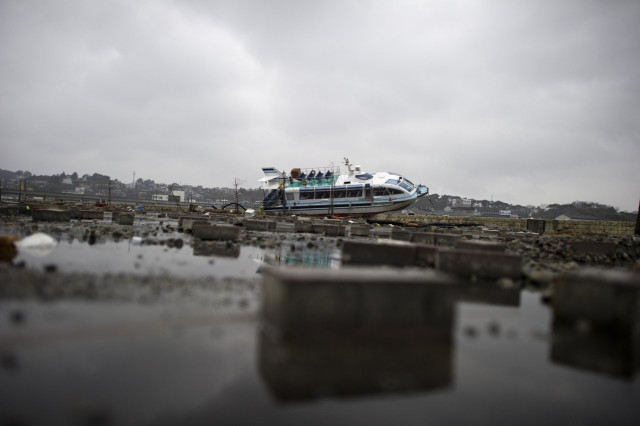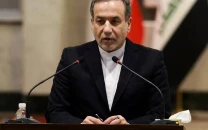Blasts, fire escalate Japan's nuclear crisis
Radiation leaks by quake-hit nuclear plant sparks collapse on stock market and panic-buying in supermarkets.

Tokyo stocks, which were punished Monday in a frantic sell-off that sent indexes around the world sliding, plummeted another 14 percent before paring some losses and ending 10.55 percent down. European and US stocks also fell sharply.
In towns and cities, fearful citizens stripped shelves of food and water, prompting the government to warn that panic-buying could hurt its ability to provide aid to areas devastated by Friday's massive quake and tsunami.
But scared Tokyo residents filled outbound trains and rushed to shops to stock up on face masks and emergency supplies amid heightening fears of radiation headed their way.
Radiation levels around the Fukushima No.1 plant on the eastern coast had "risen considerably", Prime Minister Naoto Kan said, and his chief spokesman announced it had reached the point where it endangered human health.
In Tokyo, 250 kilometres to the southwest, authorities also said that higher-than-normal radiation levels had been detected in the capital, the world's biggest urban area, but not at harmful levels.
Kan warned people living up to 10 kilometres beyond a 20 km exclusion zone around the nuclear plant to stay indoors.
"I would like to ask the nation, although this incident is of great concern, I ask you to react very calmly," he said.
The UN weather agency said that winds were currently blowing radioactive material towards the ocean, and that there were "no implications" for Japan or countries nearby.
France's Nuclear Safety Authority said the disaster now equated to a six on the seven-point international scale for nuclear accidents, ranking the crisis second only in gravity to Chernobyl.
Japan however maintained its assessment of the disaster at a four, placing it behind the Three Mile Island accident in the United States 1979.
The disaster also prompted Russia and Germany to order immediate reviews of their atomic energy sectors, with Berlin saying it would provisionally shut down seven nuclear reactors for three months pending a safety assessment.
"What we most fear is a radiation leak from the nuclear plant," Kaoru Hashimoto, 36, a housewife living in Fukushima city, 80 kilometres northwest of the stricken plant, told AFP by phone.
Hashimoto said supermarkets were open but shelves were completely empty. "Many children are sick in this cold weather but pharmacies are closed. Emergency relief goods have not reached evacuation centres in the city.
"Everyone is anxious and wants to get out of town. But there is no more petrol."
More than 200,000 people have already been evacuated from the exclusion zone around the crippled plant.
The machinery of modern life has been crumpled almost beyond recognition as far as the eye can see – cars are stuck incongruously into the few remaining structures or balanced on top of wrecked homes.
Aid workers and search teams from across the world have joined 100,000 Japanese soldiers in a massive relief push in the shattered areas.
The government expects a "considerable" economic impact from the disaster, which has plunged the nation into what Prime Minister Kan called its worst crisis since World War II.
Singapore's DBS Bank estimated that the twin disasters would cost Japan's economy about $100 billion, or about two percentage points of its annual gross domestic product.
Japan radiation leaking 'directly' into air: IAEA
Japan has told the UN nuclear watchdog radioactivity was being released "directly" into the atmosphere from the site of an earthquake-stricken reactor and that it had put out a fire at a spent fuel storage pond there.
The International Atomic Energy Agency (IAEA), citing information it had received from Japanese authorities at 0350 GMT, said on Tuesday dose rates of up to 400 millisievert per hour have been reported at the Fukushima power plant site.
It did not give details or comparisons on the radiation level but exposure to over 100 millisieverts a year is a level which can lead to cancer, according to the World Nuclear Association. The Vienna-based IAEA uses the unit to measure doses of radiation received by people.
"The Japanese authorities are saying that there is a possibility that the fire was caused by a hydrogen explosion," the IAEA said in a statement. It later said that the fire had been extinguished at Unit 4 of the plant.
In Japan, authorities warned radiation levels had become "significantly" higher around the nuclear power plant on Tuesday after explosions at two reactors, and the French embassy said a low-level radioactive wind could reach Tokyo within hours.
The IAEA said it had been informed "that the spent fuel storage pond at the Unit 4 reactor of the Fukushima Daiichi nuclear power plant is on fire and radioactivity is being released directly into the atmosphere".
Researchers say people get about 12 millisieverts from a standard CT (computed tomography) heart scan.
The IAEA said Japanese authorities had also informed it that there had been an explosion at the Unit 2 reactor at the Fukushima Daiichi plant, saying it occurred at around 0620 local time in Japan.


















COMMENTS
Comments are moderated and generally will be posted if they are on-topic and not abusive.
For more information, please see our Comments FAQ